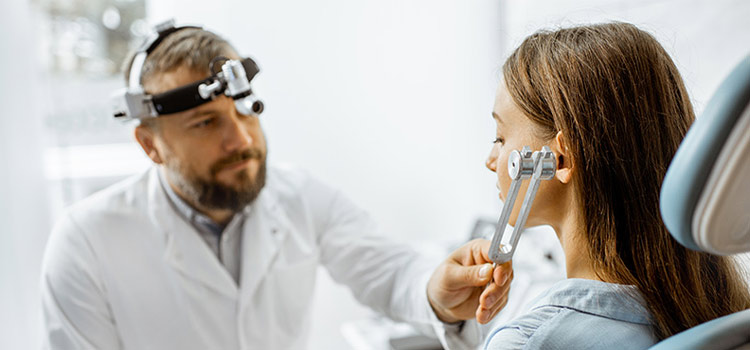Personal Development
How to Become an Audiologist
Audiologists are responsible for helping people with hearing loss or dizziness because of their ears. Hearing impairment can be prevalent in both the paediatric and elderly population. According to the BBC, “Age-related hearing loss is the most common hearing complaint affecting the elderly population in the UK. Also, Tinnitus, a medical term for any noise heard in the ears or in the head, affects 4.7 million in the UK.” As a result, the profession of audiology is growing with expanded career opportunities for audiologists in the UK.
If you have people skills, possess an interest in science and technology, you can decide to pursue your career in audiology. This blog can further help you know in detail how to become an audiologist.
Table of Content
- Who is an Audiologist?
- What does an Audiologist Do?
- What are the Most Important Qualities to have as an Audiologist?
- Where do Audiologists Work?
- What is the difference between an Audiologist and an ENT?
- What is the difference between an Audiologist and a Hearing Instrument Specialist (HIS)?
- How to Become an Audiologist: Available Educational Routes
- How to Obtain an Audiology Voluntary Experience?
- How Much Does an Audiologist Make?
- Career prospects
- Conclusion
- What to Read Next:
Who is an Audiologist?
An audiologist is a hearing healthcare professional who focuses on the problems related to the auditory system. Audiologists specialise in the diagnosis and treatment of hearing loss and balance disorders in adults and children.
What does an Audiologist Do?
Audiologists provide professional and personalised services to people dealing with auditory problems. Audiologists are trained to perform a wide variety of tasks, which include-
- Diagnosing and treating hearing loss, tinnitus and balance disorders
- Explaining how to protect hearing from the effects of noise
- Providing comprehensive hearing tests
- Selecting and dispensing hearing aids
- Teaching patients how to use their new hearing aid
- Repairing faulty hearing aids
- Giving patients information and advice on how to manage their condition
- Designing and implementing auditory rehabilitation and related communication programs
- Assisting in the monitoring of cochlear implants and bone-anchored hearing systems
- Aiding in research pertinent to the prevention, identification and management of hearing loss, tinnitus and balance system dysfunction
What are the Most Important Qualities to have as an Audiologist?

Personal Development Course Online – Masterclass
There are some specific qualities that audiologists should possess to perform their role meticulously. The skills are-
Problem-solving skills
The first quality that audiologists need to have is being good at solving problems. They need to figure out what is causing hearing and balance issues and determine what sort of treatments are going to be most suitable.
Patience
An excellent audiologist is patient and takes the time to treat their patients to the best of their abilities. They do not try to rush through the hearing exam and do not just provide you with any old treatment plan. Their patience allows them to think through every option until the perfect solution is found.
Compassion
Audiologists work with people who are having issues with balance or hearing. They should be empathetic and supportive towards their patients. If they are strictly business in their approach, their patients will struggle to trust their treatment.
Time management skill
Time management is an essential quality for audiologists as it shows that you are good enough to carry out a professional job without rushing to your work or dragging it out too long.
Communication skills
Audiologists need to propose treatments to their patients and they need to make sure that this information is communicated to patients in a proper manner. They may also need to work with education specialists and other healthcare providers regarding patient care. That is why they should be clear and concise while speaking. They should also be able to explain things using terms that aren’t complicated.
Where do Audiologists Work?
Audiologists frequently work in –
- Physicians’ offices
- Private practices
- Audiology clinics and hospitals
- State Funded Facility for the Hearing Impaired
- Educational Audiology – Public and Private Schools
- University- Academic and Research Based
- Industrial Hearing Conservation and Forensic Audiology
- Rehabilitation centres, long-term and residential healthcare facilities
Nature of Work
Audiologists are skilled in the evaluation, diagnosis and treatment of hearing problems. They work with patients of all ages, from newborns to centenarians, who suffer from hearing and balance disorders. Audiologists need to work with other healthcare professionals, including physicians, physical therapists, optometrists, teachers, and speech-language pathologists and make medical referrals when necessary.
Along with fitting and dispensing hearing aids and other assistive devices, audiologists manage hearing loss prevention programs, provide tinnitus retraining therapy, participate in forensic audiology and evaluate auditory processing disorders. They also remain responsible for counselling older adults and their families about hearing loss.
During training, audiologists get an opportunity to experience work in a variety of different hospital laboratories. They may have to travel to other training centres as well, as a part of the programme rotations. If the centres are in other parts of the country, they have to stay there for a few weeks at a time.
You won’t usually have to travel once qualified but may need to visit other hospitals or clinics. However, at a senior level, audiologists are expected to travel to local and national meetings and events to provide training and give presentations.
Working Hours
The work environment of the practising audiologist is most often similar to that of a medical professional. Audiologists lend themselves to a 9-5 workday and a standard 37.5 hours a week.
In some cases, this may include occasional weekends. Clinically-based practices may rotate services at several locations for the convenience of patients. A part-time job is also available.
What is the difference between an Audiologist and an ENT?
Ear, nose and throat (ENT) specialists are medical doctors who attended medical school and specialised in otolaryngology. They are able to carry out more comprehensive tests than an audiologist and can prescribe pharmaceutical treatments or perform surgery. ENT specialists can diagnose disorders of the ear, nose, throat and lower skull areas.
On the contrary, audiologists often work in ENT offices, administering hearing tests and dispensing hearing aids. If you have hearing trouble, audiologists should be your first port of call. If your troubles pertain more to a loss of balance or feeling of pressure in the inner ear, you better pay a visit to an ENT specialist.
What is the difference between an Audiologist and a Hearing Instrument Specialist (HIS)?
Hearing instrument specialists are trained to administer hearing evaluations to fit hearing aids. They do not have advanced degrees like audiologists, trained to perform full diagnostic evaluations of the auditory system from the outer ear to the brain. Audiologists often work closely with otolaryngologists to diagnose and treat complex hearing problems and can assist with cochlear implant auditory rehabilitation.
How to Become an Audiologist: Available Educational Routes
You can start off your career as an audiologist by attaining the required qualifications, which ranges from GCSEs to a relevant honours degree.
With GCSEs
With an equivalent of three GCSEs at grade C or above, you can enter a role as a newborn hearing screener. It can be advantageous to have a nursery nursing or child-care related qualification like NNEB, BTEC or NVQ. However, requirements can vary according to employers.
With A-levels or equivalent qualifications
If you have at least two A2 or A-levels including science subjects and a good spread of GCSEs at A-C grade, you can take an accredited BSc degree in audiology. This work-based distance learning course can be completed within a year or two and is designed for ambitious audiologists who are working in the NHS, private and independent sectors.
The course covers vocational topics like tinnitus assessment and management, managing clients with special needs, hearing in children and implantable hearing devices. Enrolling in a BSc degree will allow you to learn from the leading academics and develop specialist expertise during your substantive final project.
Audiology Foundation Degree
If you are already working for an HCPC or RCCP – registered employer, with a supervisor who is a registered Audiologist and Hearing Aid Dispenser, you can go for a Hearing Aid Audiology FdSc course to further progress in your career.
This type of flexible two-year qualification can provide you with various benefits. In addition, you will achieve the skills of a qualified hearing aid audiologist while working and earning at a time. You will also develop a deep understanding of the physical and psychological aspects of hearing disorders and their impact on people’s lives, along with the ethical and legal issues that relate to being an audiology practitioner.
How to Obtain an Audiology Voluntary Experience?
You can obtain practical experience by applying for an audiology-related volunteer position with a government or third sector organisation. This might make you a more attractive candidate for an entry-level job or university course.
There are a couple of ways to get some voluntary experience. You can either contact your local NHS trust to find out about opportunities at a hospital or health centre near you or work for an established charity.
How Much Does an Audiologist Make?
According to the National Careers Service, “The initial salary of an audiologist is £25,654 while an experienced audiologist can earn up to £45,838.”
As per Salary Explorer, “On average, an audiologist’s salary doubles their starting salary by the time they cross the 10 years experience mark.” The table below shows the audiologists’ average salary change with their experience in the United Kingdom.
| Years of Experience | Salary |
| 0 – 2 Years | 78,200 GBP |
| 2-5 Years | 100,000 GBP |
| 5-10 Years | 139,000 GBP |
| 10-15 Years | 172,000 GBP |
The salary range of audiologists can vary according to location. The following table shows some of the highest paying cities for audiologists in the UK, as suggested by indeed.
| City | Salary |
| London | £41,644 |
| Bournemouth | £39,810 |
| Oxford | £37,024 |
| Nottingham | £33,734 |
| Bristol | £31,775 |
Career prospects
There is a structured career path for those who work for the NHS. You can progress through the grades by gaining experience and completing advanced training, study and research. Promotion is based on merit and you may need to move to other hospitals to make the most of the available opportunities.
As you progress in your career, you are likely to take on a more supervisory role. Promotion to the deputy head or head of the department is expected to involve the management of major departmental sections. It is possible to gain a senior position by making a significant contribution to your area of expertise.
There are also opportunities to shift into research and teaching by working for a university or research institute. You can get involved in training and registration assessments as well.
Conclusion
As an audiologist, you can help people regain their lost hearing capacity. This job can be an extremely rewarding one. As Lucy Tinker, an audiological scientist working within Cambridge University Hospital NHS Foundation Trust, expressed, “It is often most satisfying to see children who are fitted in their early years after diagnosis who start to give little indications about how they are hearing, like starting to produce single words then link them together.”
You can also contribute and be a part of this fulfilling job. All you need to do is earn the right qualification and training and have the enthusiasm to step into this field.
What to Read Next:
- How to Take care of a Baby Owl – Video Guide Include
- How to Become a Solicitor – Step by Step Guide
- How to Become a Detective in the UK
- How to Become an Accountant? A to Z Guide to Become an Accountant
- How to Become a Youth Worker
- How to Become a Dermatologist in the UK – The Ultimate Guide
- How to Become a Speech Therapist










